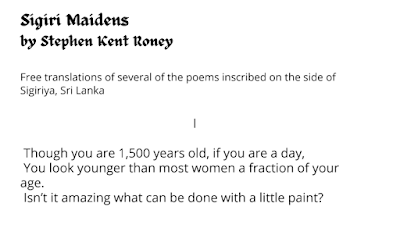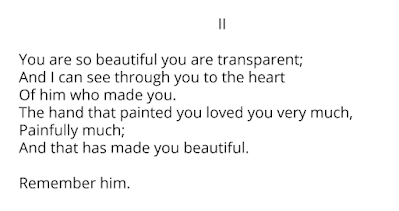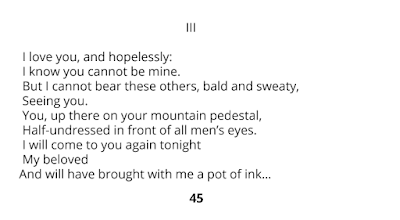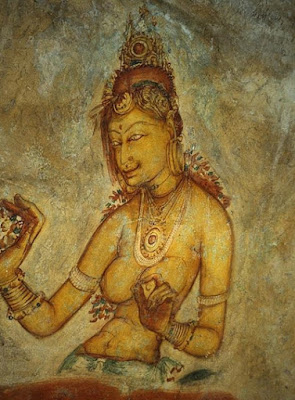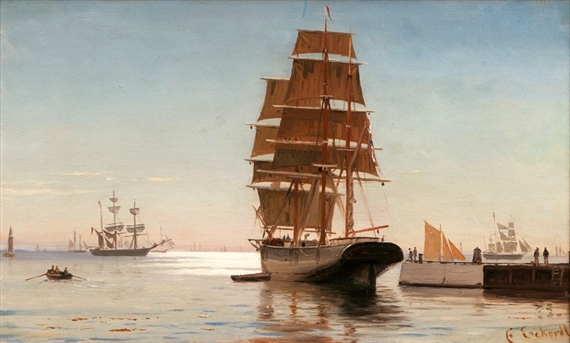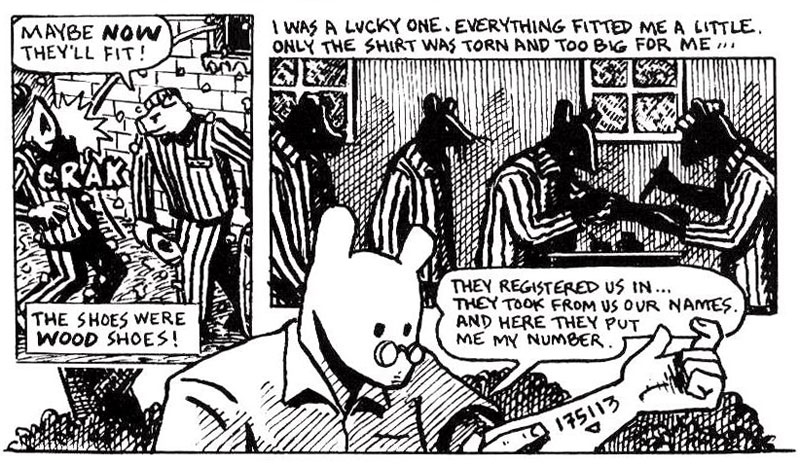Friday, April 28, 2023
Tuesday, April 25, 2023
The Reality of Child Abuse
In his latest column, Xerxes the Leftarian condemns “punishment-based systems”—he cites English public schools—and congratulate the Canadian government on Bill S-251, which apparently will criminalize spanking.
I’m not sure whether he is opposing all punishment, or only physical punishments.
Let’s first deal with punishment in general first:
If punishment is wrong intrinsically, then having laws and a police force and a prison system must be wrong. We should instead simply point out to criminals that their behaviour is undesirable, and all will be well. After all, they are old enough to understand. Pity, too, nobody tried that with Hitler.
Surely that would not work. So why would it work with children?
Moreover, so long as you give kids marks in school, or allow them to play sports, you have a punishment-based system: students who do not do the work, or even are simply less mentally capable, are punished by being shamed, often publicly shamed, with low marks. Kids who can’t skate or swing as well lose the game, and mess up in front of friends, family, perhaps an audience of strangers. Yet we need to have marks in school; we mustn’t think of abolishing grades. For one thing, it is the only way to know whether anything useful is happening in a school. For another, for the same reason that we need specific training and qualifications for someone who is going to work as a doctor, or a child-care worker, or a plumber. Competence is an objective quality. And we need to teach children for the real world, the world they will live in; we cannot keep them babies forever. Children need to know whether they are doing the right thing, and whether they are doing well or badly. They do not know by instinct. To leave them without guidance is the ultimate cruelty.
You might argue, “Oh, but make it a rewards-only system.” That cannot work, any more than you can have up without down. Give out any sort of reward, and, unless you give to everyone, the absence of the reward remains damning.
So perhaps Xerxes is objecting to corporal punishment specifically. I suspect so. I suspect he means to assert that this is somehow worse than emotional punishment, say: such as causing a child to feel shame, perhaps in front of fellows or parents, or sending him to his room to brood alone, or making him write something on the blackboard 100 times.
But think about it. Why is it worse? Surely only if you hold the body, the physical, to be more important than the spiritual. This would seem to reverse the proper valences: we should be teaching our children not that their bodies, but their character and their conscience, are the most important of their possessions.
This is actually in part what the tradition of spanking or the like does. It teaches the child not to overvalue their physical comfort, and teaches physical courage. There is the usual revelation; “that didn’t hurt that much.” It is an important lesson, and reduces unnecessary fear forever after.
Even if you do not consider the Bible sacred, it is nevertheless the repository of thousands of years of acquired wisdom. It does not speak out against physical punishment of children. In fact, Proverbs 13:24 says: “He who spares the rod hates his son, but he who loves him is careful to discipline him.”
Chesterton’s warning applies here: do not tear down an old fence because you do not know why it is there. Tear it down only if you know exactly why it is there—and can be sure it is no longer needed.
While seeing no problem with striking a child even with a rod, the Bible does condemn child abuse. And sternly:
“If anyone causes one of these little ones—those who believe in me—to stumble, it would be better for them to have a large millstone hung around their neck and to be drowned in the depths of the sea. Woe to the world because of the things that cause people to stumble! Such things must come, but woe to the person through whom they come!”
This is child abuse—not something so trivial as a spanking. It is misleading a child; gaslighting them.
To characterise spanking as “child abuse” or “bullying” is the perfect way to conceal and enable this real child abuse: either not teaching children moral values, giving them no guidance, teaching them false values, or forcing or encouraging them to go against their conscience.
Like teaching them their body is sacred, but not their soul.
Sunday, April 23, 2023
Sigiri Maidens
Pleased to report that my three short poems "Sigiri Maidens" have been published in the April 2023 issue of Qutub Minar Review, an international poetry journal out of India. Some of the other congtributors are quite impressive.
Paperback edition: https://www.lulu.com/shop/som/qutub-minar-review-april-2023-issue/paperback/product-vvdkgw.html?page=1&pageSize=4
(To avail 15% discount on paperback use discount code: WELCOME15 . Discount code is available for all those who wish to support this project.)
E-edition link: https://qutubminarreview.wordpress.com/qutub-minar-review-april-2023-issue/
Saturday, April 22, 2023
Why Bud Light Blew It
How on planet Earth did the VP of Marketing for Bud Light ever think that using Dylan Mulvaney as a brand spokesperson was going to go well? Even on first seeing the Mulvaney spot, my jaw dropped. How could this look like a good idea, given their market? For a March Madness campaign?
I don’t think it was just stupidity. Granted, in an interview explaining her marketing plans, Alissa Heinerscheid seemed capable only of a word salad, just barfing out buzzwords. One got the strong impression she had no idea what she was talking about. Not the brightest bulb in the scoreboard. One might suspect she was incapable of independent thought, and so simply chose Mulvaney and the trans theme because she saw others doing it. Trans was hot and trendy. Edgy, but safe. Right?
But no; nobody is that dumb. She is deluded. Such word salads are typical of narcissists, who only speak to manipulate or impress. And narcissists live on self-delusion.
Here’s how she would have thought it through, assuming she is a narcissist. Bud Light is an extremely successful brand. It is an absolute icon in America, an institution. Rather like those statues of Civil War heroes, or Sir John A. Macdonald, or Queen Victoria.
Alissa Heinerscheid happily found herself in control of an institution. Now what was she going to do about it?
Problem: she did not create this great success. Simply sustaining success was not enough to make her own role special. To demonstrate her superiority to all who came before her, or may come after, it must be in crisis. Whoever created this original success must be a worm, an utter failure. She must either remake it entirely in her own image, or, failing this, destroy it. A narcissist, like a tomcat, must pee on everything to mark his territory.
And that is what she did, more or less exactly as she intended. If this seems self-destructive—after all, she has lost her job and wrecked her reputation in her chosen field--narcissists can be deluded enough that they expect reality to conform to their wishes. If it does not, it is obviously not their fault. Reality is to blame. Who could have predicted Bud Light drinkers would be such reprehensible transphobes? Shame on them!
Dylan Mulvaney, a fellow narcissist, makes all the same assumptions.
Beware, hallowed institutions. Hire a narcissist, put them in a position of authority, and you are going to pay dearly.
And there is a current epidemic of narcissism, thanks to generations of “unconditional love” and “self-esteem.”
RFK Jr. on Neil Cavuto
Watching RFK Jr. interviewed by Neil Cavuto, I am impressed. It certainly helps to see the variety of crosses behind him. It makes him look like a serious Catholic. I am also impressed by his white bookshelves, or they eerily remind me of those in my grandfather’s house, back when JFK was president and all was right with the world. I’m tripping on the Kennedy nostalgia. But he also came across as sincere and intelligent.
He starts of course with powerful name recognition, and with the equivalent of a respected brand. I see that, even though I was not a fan of his father back in the day. He has nostalgia on his side. Many, amid the current chaos, dream of a return to something that seems like normalcy and decency. This was the illusory appeal of Joe Biden. Kennedy has that to an exponential degree—back to the Kennedy years! Back to Camelot! Back to a day when honour mattered!
I think his speech impediment is also an advantage. Like Chretien’s facial paralysis or Churchill’s stammer, it suggests sincerity and evokes sympathy. As do his sunken cheeks, as does the martyrdom of his father. We feel he has suffered. We believe he can understand our pain.
His longtime anti-vax campaign also seems to me to help him. He fought for an unpopular cause—this demonstrates that he is a man of principle. It marks him as an anti-politician. People are craving someone they can trust, and they can’t trust politicians any longer—this was Trump’s great appeal. Kennedy reinforces that by his manner, at least in this interview. He does not give the impression that he is guarding his words, or calculating them. He answers quickly and directly. This also shows his intelligence, in stark contrast to Biden or Kamala Harris, and dispels any concern, given his anti-vax beliefs, that he is some crackpot.
His history of opposing vaccines positions him as the ideal spokesman against the Covid vaccine mandates. This ought to be a vital issue, and a devastating one, and his presence in the race will force it to come out.
He is wisely appealing to unity. That is a message many want to hear, given the current atmosphere of near-civil war. It was the illusory promise offered by Obama, that got him into the White House.
He is also stealing a page from Trump and the populists by railing against the corporate-government axis.
He also profits from the Democrats’ weak front bench. Biden is senile; the US economy is in a mess under his presidency. Not to mention general chaos in the culture and the streets. Anybody would look better. But Kamala Harris looks incompetent and bubblebrained. Gavin Newsom has objectively done an awful job in California—he was recalled, and people are leaving the state. San Francisco is a war zone. Pete Buttigieg has been awful as Transportation Secretary. J.B. Pritzker is presiding over Chicago dissolving into chaos. Tulsi Gabbard and Andrew Yang, their two most promising candidates last cycle, have left the party.
Unless he is blocked by the party machine, as he is likely to be, I think he has an excellent chance at the nomination.
If he gets the nomination, I think then he has an excellent chance in a general election.
Friday, April 21, 2023
Exit Ramps
 |
| What might have been... |
At a recent neighbourhood meeting, several people made the comment “it feels as though the world is coming to an end.” Another comment heard more than once: “it seems that everyone has gone mad.”
How do we get out of this mess, when all the world seems mad and coming apart?
1. Barbarians at the gate. A less civilized, less decadent, more unified force appears from beyond the margins, and establishes some new order. This was the Arabs in the decline of the Sassanid Empire, the Muslims in the case of the Byzantines, the Manchus in China.
But in the present case, it seems to me there are no barbarians left. There are no more margins. Possibly an enthusiastically Christian Africa, or a newly liberal-democratic Eastern Europe, relatively recently emerged from the old margin of the Iron Curtain. Or conceivably, after regime collapse, a China animated by new ideals of liberal democracy, Christianity or Falun Gong.
2. The man on a white horse. A commanding figure that the people in general feel they can trust, who seizes or is given dictatorial power to crack heads and restore order. There has clearly been a craving for this in recent years. This was the appeal of Trump in 2016, of Duterte in the Philippines, of Xi in China. This is supremely dangerous: this is also Hitler, Napoleon, or Robespierre. On the other hand, sometimes it turns out reasonably well: a DeGaulle, for example. Kenyatta, Mandela.
In the present case, is there anyone on the horizon, at least for the US, the most important country? If it is to turn out well, the man on the horse must appear to both sides to be at least an honest broker, to be generally respected if not loved. This leaves out Trump; too clownish. He hardly any longer looks like a way out of chaos.
In Canada, Trudeau was probably elected for this role, and has certainly been trying to seize autocratic if not dictatorial powers. But he too, now looks like a cause of chaos, not a solution.
LePen might pull this off in France. Meloni may do it in Italy. It may help to be a women. Men are accustomed to defer to women and give them the benefit of the doubt. But it has to be a woman who looks decisive as well, a Thatcher. Kamala Harris does not seem able to fit this bill; she does not inspire respect at all. The craving for a firm hand probably snagged Truss the British premiership; but it seems she moved too fast to soon. Or blinked.
RFK Jr. might fit this role; he is more or less the American equivalent of Justin Trudeau circa 2015 in terms of candidate image. It helps that he is coming from outside politics. It helps that he evokes nostalgia for a more ordered time with his very name. (Although the Sixties were really not well ordered, they seem so in retrospect.) His campaign for the Democratic nomination may go better than expected. He might win the presidency; and that might be good or bad, depending on his character; but working against him is Democratic party backroom that rigs the system against mavericks.
3. Revolution or civil war. Tim Poole speaks of this often. He has experience of revolution and civil war. He may be right.
This too has obviously happened before. Usually it turns out badly, sometimes it turns out well. When it turns out well, it is because there is a competent and organized opposition able to take power. Is there such an uncompromised sector of US or Western culture?
Not the church. Not the corporate world. Not the military. Not the civil service. All have now been compromised, and seem part of the problem. I think we’re in trouble if this happens. Worse chaos likely ensues.
4. One can fantasize, at least, about God intervening. Not necessarily descending on clouds of glory to judge the living and the dead; perhaps through a religious revival. We have seen the Asbury revival recently. Is there a spark? Is there kindling?
Possible historical examples of this working are Christianity in the Roman Empire; or the Chosun (Joseon) Dynasty in Korea, which replaced a decadent Buddhist zeitgeist with Confucian rigor. A seemingly decadent and disunited Britain at the end of the eighteenth and beginning of the nineteenth centuries, having lost its first empire, and shaken by the French, American, Chartist, and Irish revolutions, seemed then to pull itself together under the invigorating influence of Victorian morality, Methodism, and the social gospel.
Here's hoping for option four.
Thursday, April 20, 2023
Father Joe
 |
| McCarrick. |
I once lived with a Catholic priest, who took his title “father” seriously. He considered himself equivalent to the father in a family. And he once wrote a piece for publication arguing that being a father was a kind of martyrdom, that a father dies every day for his children. His editor tried to convince him not to make this claim; it sounded bizarre. And I agreed with the editor.
Now that I have had a good deal of experience as a father, it seems yet more bizarre. It is the opposite of the truth. We parents live through the eyes of our children. They give us a second, perhaps a third, perhaps a fourth, life. Perhaps more: the chain of descent is a primitive form of immortality.
But Father Joe was adamant. He even mocked his editor for not agreeing. He saw it as an obvious insight. He was a martyr for his congregation, and felt good about himself for it. Accordingly, each parent was also a martyr, being killed by their own children.
I realize now that Father Joe was a narcissist. Many members of the clergy are: it is a role that proclaims “I am better than others.” The Bible calls them Pharisees.
This would explain the supposed tragedy of parenthood. A narcissist would indeed consider the existence of the child (or parishioner) an affront to themselves, in that it requires them to consider the interests of someone other than themselves, and sometimes deny their own desires for another. Indeed, to demand this is, in the mind of the narcissist, an assault, even murder. Consider the “transsexuals” insisting that if you do not use their chosen pronouns, or let them use their preferred washrooms, you are guilty of genocide. This is the way the narcissist sees the world. This makes them dangerous and capable of violence.
This can then justify the narcissist in any kind of abuse of their children. Or, among clergy, any kind of abuse of young parishioners. They had better be useful to the narcissist in some important way, to justify their existence.
There is a trope in Greek myth of a parent consulting an oracle on the birth of a child; and being told the child will grow up to replace them. As a result, they persecute and try to kill the child.
Of course, this is always simply true. In the normal course of nature, the child will outlive the parent. So what is the point of this oracle?
I think this is a literary convention to make objective the inner thoughts of the narcissistic parent: children are evil. They require attention, and they are likely to survive him or her. This is an affront to the narcissistic ego.
Freud’s imaginary Oedipus complex probably springs from the same roots. There is much child hatred in the real world. Look at the numbers for abortion, for pedophilia, and for child sex mutilation.
Wednesday, April 19, 2023
Coming of Age in Canada
Last week, I helped a student edit a poem for his high school English class. It was required to be on the theme of “coming of age.” He thought of the metaphor of a ship casting off the lines and leaving the pier for the open sea. I thought it was quite beautiful.
But the teacher was unhappy with it, and without revision threatened a low mark. To begin with, she took the word “tack,” referring to directing a ship, for an error. She was sure enough of herself not to look it up in the dictionary. So he lost marks.
Perhaps to her dictionaries are oppressive, lest they contradict her “lived experience.”
But the bigger problem was that the poem gave no “cause” for “coming of age.” At last we puzzled out that she was expecting some rebellion against parents and society. It was not permissible to see growing up just as striking off on your own. It had to involve rejecting whatever your parents had taught you.
This was a special problem for my student, because he is Chinese. Not Chinese-Canadian. Chinese, attending a Canadian high school. To him, the thought was shocking. Filial piety and respect for your ancestors is among the deepest of Confucian values.
I found it admirable that, on figuring out this is what his teacher wanted, he declared that, rather than accede he would take a lower mark.
But it illustrates how harmful our schools may have become. The agenda of this teacher at least—and she is not alone—is not to educate, but to de-educate, to dismantle anything the student might already know.
Tuesday, April 18, 2023
Poor Scrappy Little Independent CBC
Elon Musk has labelled the CBC “government funded media” on Twitter.
Justin Trudeau has publicly protested. He seems enraged. The CBC has threatened to leave Twitter.
Remarkably, everything Justin Trudeau says about the matter is not only a lie, but the opposite of the truth. It is illustrative of narcissistic gaslighting generally. When you are a convinced liar, it is generally not enough in your own mind to lie. You fear the truth, you generally feel safest getting as far away from it as possible.
You can see such fear in Trudeau’s eyes. Granted, it looks like anger—narcissistic rage—but narcissistic rage is a “fight or flight” response. Narcissists are haunted by their own conscience. It makes them dangerous.
To begin with, of course, the CBC is indeed government funded. This is simply the literal truth, and this is what Trudeau is furious about, and calls an “attack.”
Trudeau blames Pierre Poilievre, leader of the official opposition, for the label. Poilievre did indeed write to Musk requesting this; but Twitter is simultaneously so labelling NPR, PBS, the BBC, New Zealand state TV, Al Jazeera, and the Australian Broadcasting Corporation. It would be odd to expect special treatment for the CBC no matter what Poilievre said.
In the same sentence, Trudeau describes the CBC as an “independent media organization.” Which is exactly what it is not. By insisting that it is, and objecting to the factual statement that it is government funded as an “attack,” Trudeau is admitting in a backhanded way, as narcissists do, that he knows he is in the wrong: he knows there is something deeply wrong with the way the Canadian government is funding and trying to control the media.
He stresses that the CBC delivers “local news and local content,” as if it were some small local operation up against a big impersonal business. But the CBC is the big national operation; and Trudeau is doing everything he can, with Bill C-11, to suppress independent local media and content—the YouTubers.
Trudeau then says that in criticizing the CBC Poilievre is attacking Canadian culture. One common criticisms of the CBC is that it does not promote Canadian culture. Instead, it is all in for multiculturalism, which is to say, foreign culture, and full of “woke” criticism of Canadian culture as racist. Trudeau has actually claimed that Canada has no mainstream culture.
He accuses Poilievre of, in his supposed campaign against Canadians, “running to American billionaires; the tech giants.” That would presumably be Elon Musk, one billionaire, the chief actual opposition to the “tech giants.” And Musk is a Canadian citizen.
Nice try at fomenting anti-American hatred, by the way.
Trudeau ends with accusing the Conservatives of “always defending the tech giants.” It has been the left in the US that has been colluding to an almost Fascist degree with the tech giants. In Canada, the Liberals just gave the green light to a hi-tech merger of Rogers and Shaw. They tend to be in corporate pockets generally. SNC Lavelin? Power Corporation? The Tories, by contrast, are mostly the party of small business.
This is not an honest or a decent man. And he holds the Canadian people in contempt.
Wise Words
“If you’re a child and your parents stop loving you, you don’t
stop loving your parents.
You stop loving yourself.”
– Senator John Kennedy
Monday, April 17, 2023
Narcissistic Family Values
As we have established that Spiegelman’s Maus is a portrait of narcissism/hubris/pride, it becomes instructive. It explains a great deal.
Art is inept at handiwork; the reason is because, as a child, his father criticised his every attempt. Vladek rubs this in by demanding Art come and help him with some repair. It is not enough when Art offers to pay for a tradesman.
Narcissists make terrible teachers. Their vested interest is always in being better than their pupil. So their interest is in preventing learning.
This is an important reason why I believe the business of evaluation must be separated from that of teaching. Narcissists will be drawn to the teaching profession by the opportunity to evaluate and to be the centre of attention. Taking this away from them is one way to keep narcissists out of the profession, where otherwise they have an ideal chance to bully. Making the teacher the evaluator is asking for trouble.
Art explains that he went into graphic arts and cartooning because it was the one activity where he was confident his father would not follow. Only there could he be free.
This is also why Franz Kafka went into writing—because he knew his abusive father would never read them. So only there could he be free.
Narcissists have no eye for art nor ear for fiction. They dare not step outside themselves far enough to experience the suspension of disbelief necessary to appreciate art. If they ever do read a story or watch a movie, they will want something painfully sentimental. Big-eyed kittens; a dying child; it is like being deaf and only hearing especially loud noises.
This is no doubt why Jesus spoke in parables. It meant the pigs could not see and trample the pearls.
And this is no doubt why writers and artists almost always seem to come from abusive childhoods. Hemingway said this was the one prerequisite for a writer.
Note how Vladek seems obsessed over his will. A normal person would just write it up once, and be done. By his own admission he keeps changing it. He repeats to Artie that Mala is after it, yet he wants to leave it all to him. What does he say to Mala? He is using it as a bribe to keep himself the centre of attention.
At the end of Maus I, Vladek reveals that he burned all his wife’s memoirs. And immediately after admitting this, he explains that they were written for Art. “I wish my son, when he grows up, he will be interested in this.” A twisting of the knife.
A narcissist has no family loyalties. He will try to disrupt any family loyalties other than to him. He will readily betray both wife and son.
Sunday, April 16, 2023
The 51st State
Tucker Carlson has a large and enthusiastic audience. It seems likely his suggestion that Canada needs to be liberated will generate some attention in the US.
Which causes me to ponder: if the US invaded Canada, how would Canadians react? Would American GIs be greeted as liberators?
A few years ago, I would have thought the idea absurd. But not so much anymore. I noticed that the Freedom Convoy supporters, and attendees at other protests since, have been flying "friendship" flags that combine the Canadian and American flags. Why this at a protest—unless it is a call for unification?
There is no political party in Canada that supports the idea. You might think this proves there is no popular support. Yet that is neither here nor there. Political parties in Canada have a history of withholding choices from the public. Meech Lake, abortion, gay marriage, aboriginal rights, come to mind. There are some matters the Canadian elite does not want people voting on.
The working class stiffs in the Freedom Convoy are probably aware that they pay a premium for Canadian independence. American wages are higher. The American cost of living is lower. The work opportunities are more plentiful.
For the working man, and for the poor, there needs to be some good reason for Canada.
The original justification for English Canada was to preserve the ties to the monarchy, and to British traditions. This justification has, however, been hollowing out ever since 1867. Nobody thinks of Canada any longer as particularly “British.” No; it is now “multicultural,” and the elite generally dislike anything British. Down to renaming streets and schools.
Yet the old rationale h not been replaced by a distinct Canadian identity. This has happened in French Canada, and there was a concerted effort to develop a distinct Canadian culture beginning with D’Arcy McGee, who foresaw the need, and continuing up to the 1960s or so.
Then, just as it seemed to be coming together, the elite crushed it.
It has been destroyed by “multiculturalism,” now actually enshrined in the Canadian constitution. Any authentically Canadian culture is now condemned as "racist," or "white supremacist"; Justin Trudeau declares that in Canada, “there is no mainstream.”
With no Britishness, and no local culture, there is no reason for Canada to exist as a separate nation. The economics are entirely in favour of joining the USA. At the same time, this seems increasingly advisable to protect our civil rights from rogue government. Not to mention protection from less friendly and more oppressie foreign powers, like China.
Our government and our elite may have murdered Canada.
Saturday, April 15, 2023
Canadian Soft Power
Here is one more indication of how Justin Trudeau has destroyed Canadaès international reputation.
Friday, April 14, 2023
The Real Meaning of Spiegelman's Maus
Maus and Maus II are not about the Holocaust. This is a good example of how most people miss the point of creative writing as of parables. John Lewis and his publishers sought to cash in on Maus, and did, with a cheap imitation, March and March II, giving Lewis’s personal account of the civil rights movement. But it was missing the essence of Maus. They had no idea.
Maus is a
character study of Vladek Spiegelman.
Anything we
hear about the Holocaust is entirely through his eyes. And he is not driven,
like Elie Wiesel in Night, by a sense of mission to tell us about the
Holocaust. He is resistant to talking about it. He would rather talk about his romantic
conquests. And he burns his wife’s painstaking accounts of it. This is not the
action of a truth-teller.
Vladek is a
peculiar character. Most obviously, he is parsimonious to a comic extent. One
might imagine this came from his experience in the camps.
But he is
not consistently parsimonious. He scolds his second wife, Mala, for using a
wire coat hanger, the parsimonious choice, instead of a wooden one, to hang up
his son’s coat.
Then he secretly
throws his son’s coat in the garbage. Hardly parsimonious.
Granted, in
the first instance, it is his son’s loss, not his own. But then he must give
his son his own old coat.
The real
motive behind his parsimony is not to save money or conserve; it is to keep
those around him constantly on edge, and subject to criticism whatever they do.
If not being parsimonious works better every now and then, parsimony must be
sacrificed to the higher objective. The point was to give Mala or Art that acid
feeling in the pit of their stomach, and to delight in awareness that he is
making them feel bad.
Spiegelman’s
Vladek is a perceptive portrait of just what someone who has given in to the
vice of pride, aka hubris, aka narcissism, is like. Vladek is the type of
Hitler; and a study of the type.
One
characteristic of the narcissist or vice-bound is a comically two-dimensional
predictability. They form the humours of the comic stage. Narcissists act like NPCs.
Vladek’s general frugality is of that order.
Vladek appears
first in the tale to warn his son as a child that there is no such thing as a
friend. Hitler’s starting point in Mein Kampf: it is the natural Darwinian
order that everyone just looks out for themselves. For individuals and for races,
it is survival of the fittest. And this is the creed of the narcissist: it is
them against the world.
Moving to
the present, Artie goes to visit his father, and his father’s first two
sentences on seeing him after two years are complaints: first, that he is late,
and second, that he did not being his wife. Whatever Artie does, Vladek will
find reason to complain.
And he is
the same with second wife Mala, complaining about the wooden hanger. Or the
chicken is too dry.
The hanger
complaint has a second function: it is meant to sow division between mother and
child. The narcissist will always foment conflict within the family. It is a
control thing.
When Artie
asks Vladek to “start with Mom. Tell me how you met,” Vladek tells him instead about
how all the women chased him, and he had another girlfriend who desperately
wanted to marry him and was better looking than Artie’s mother. Anja, Artie’s
mother, was nothing to look at, and supposedly had a nervous disorder. She was,
as far as he is concerned, lucky to have him.
This is not
the way a father should talk about his child’s mother. Again, he is sowing
division within the family.
He then obliquely
criticizes Anja as a communist, who betrayed a friend to a three-month prison
term. It might be true; but even if so why tell it unprompted? The point of
this story seem to be to belittle the other parent in the eyes of the child.
Artie
catches his father then in a lie at least of omission—a warning to us as
audience that he is an unreliable narrator.
Doing the math, Artie realizes that Anja, his mother, must have already
been pregnant when they married. This raises the possibility that it was a
forced marriage; his father may have been playing around, heedless of the women’s
interests, and gotten caught.
Those who
give in to the sin of pride are also likely to give in to the sin of lust. As
well as that of avarice, and so forth.
Caught out
on this, Vladek tried to distract by throwing shade on Artie. He accuses him of
being premature: this looks like an ad hoc projection, not a truth. Then he
claims the doctor had to break his arm to extract him, and that, as a child, that
he often raised his arm in a “Heil Hitler” salute.
This does
not sound plausible. Does a diffuclut birth ever require the breaking of an
arm? Does the breaking of an arm ever cause involuntary movements for months or
years after? Narcissists when caught out can say almost anything. They can seem
to be momentarily delusional, as M. Scott Peck has observed.
That Vladek
is rattled at this moment is demonstrated by his spilling all the pills he has
been counting carefully.
He credits
himself with bringing Anja back from post-partum depression with his gentle and
loving care for her in a Czechoslovakia sanitarium.
Does this
sound like the Vladek we can ourselves observe?
More
likely, seeing how he behaves with his second wife and his son, he drove Anja
to the nervous breakdown. Then, rather than let her escape his grip, and
possibly have pleasant experiences without him, he grabbed the opportunity to go
with her to the posh sanitarium instead of tending to his work. As a result, by
his own account, he never got his new factory insured; it was robbed, and they
lost everything.
It is surely
actually unusual for sanitarium patients to be accompanied by “Someone they
trust.” Few can afford such a thing; and it is surely considered bad for their
recovery. The idea of the sanatoriums was to get away from their daily life, which
is apparently troubling them, not to bring some of it with them.
He tells
about the factory being robbed, presumably, because he thinks it reflects badly
on Anja. Look at the trouble her mental illness caused! Look at how I suffered
because of her!
And though
he probably believes it himself—narcissists are expert at self-delusion-- “I
did not have time to have it insured before we left” does not sound plausible.
Had time been the issue, he could have had his father-in-law insure it for him
while he was away. He was simply irresponsible; too irresponsible to think of
such things. And, as narcissists always do, he finds a scapegoat.
There is
much more, but this post is eating up too much time. I may continue later.
But the predictable
effect of having a hubristic spouse or parent is, of course, to drive the rest
of the family, especially his designated scapegoats, into depression. In Vladek’s
case, his first wife commits suicide, soon after his son is released from a
psychiatric hospital.
And, of course,
he blames his son to all the relatives for this; while his son blames his
mother for this. For whatever perverse psychological reason, nobody ever dares blame
the narcissist. That feels too dangerous.
On top of
it all, his mother having just committed suicide, and his father blaming him,
Artie at twenty is also expected to console his father, who makes himself again
the centre of attention with his dramatic expressions of grief.
The narcissist,
when distraught, must take it out on his scapegoat. If not venting his anger on
them, he will be venting his sorrow. It amounts to the same thing: the emotions
of the narcissist become the family’s problem. It is up to them to do something
about it.
This is the
root of all “depression” and much, perhaps most “mental illness”: victimization
by a narcissist in the family.
Maus lays
it out plainly, and most people refuse to see it.
Wednesday, April 12, 2023
On Drawing With Strong Lines
 |
| When the Sistine Chapel murals were cleaned some years ago, many complained that the restoration made the images too clear and vivid. They preferred the murkiness of centuries of smoke and oil. |
Teaching a student to write well, one essential piece of advice is to be clear, and avoid qualifiers. The purpose, after all, is to communicate. This is exactly the opposite of what I was told as a grad student, even in the humanities: I used to be criticized for speaking too plainly, for refusing to use them. It got me branded “arrogant.”
Many students struggle to do this, to write clearly, although it seems the simplest possible thing. As Mark Twain put it, “Writing is easy. All you have to do is take out words.”
There are two opposing forces in culture, one trying to make things as clear and simple as possible, and one trying to make things as obscure and difficult as possible. I remember on first reading Milton Friedman, being shocked at how clear and simple his ideas were. Can this be academically legitimate? Can this be right? After all, unlike Keynesianism, it actually makes sense. Yes, breaking windows really does cost money. When you spend money, you no longer have it. The obvious truth had been obscured.
Plato or Descartes are also clear and well-spoken. What a shock to discover, after always being told otherwise, that the best thinkers actually wrote plainly. Yet, in most academic courses, the works of these great thinkers are kept from you, on the claim that they are too difficult, and you are required to read prevaricating commentaries on them instead. Which are far more difficult to understand than the works they are supposedly explaining to you.
How can this be? What is going on here?
The truth is, most of us are in denial. Which means we are in frantic flight from reality. The academic elite—the scribes and Pharisees—are clearly more in denial than most.
But so too even many current poets.
The theme for this year’s National Poetry Month is “joy.”
I don’t think any real poet could have chosen that theme. After all, no prominent poet seems to have written memorably on it. I cannot conceive of Leonard Cohen writing about how happy he is. I cannot imagine T.S. Eliot doing so. William Blake did, it is true. But he followed it with the symbol of the tyger devouring the innocently joyful lamb. Schiller wrote an “Ode to Joy,” which became embarrassingly popular. But he himself disowned it, as “out of contact with reality” and “of no value to either poetry or the world.” Browning seemed to do so with “Pippa Passes,” but later he denied having any idea what the poem meant.
A fraudulent joy is the resting face of all delusion. Happy happy joy joy. Accordingly, it is virtually impossible to write an honest poem about it.
I think of the vacant smiles on the oldest Greek statues: a smiling sphinx about to tear you limb from limb; a smiling soldier about to skewer his enemy through the heart. Perhaps an ironic comment; but chilling. I think of Pogo the Clown, aka John Wayne Gacy.
A student of mine was assigned “coming of age” as his poetic theme. He wrote well of casting off the lines and drifting out to sea. And then, in the final stanza, wrote, “after all, if things go wrong, the reins are still right there by my side.”
A deliberate confusion? But of course, in the metaphor he chose, they are not. Nor are they in real life. You cannot go back to being a child.
When I pointed this out, he froze up. “But that is too sad.”
Denial.
I had to finish the poem for him.
True art must always tell the truth. That is the reason for art. If it does not, it has no purpose, or worse.
This is really the war between good and evil. Those who are committed to good will seek truth, and do everything they can to write or speak or paint clearly. Those who are committed to evil will have things to conceal, and will work hard to be obscure. And to silence those who speak truth.
George Orwell once observed that his real talent was an ability to honestly and unflinchingly face the reality of evil. It is a rare talent.
William Blake insisted that all visual art worthy of the name must have clear lines. He railed against “the Flemish ooze.”
I agree with him. It is immoral. All unnecessary lack of clarity is immoral.
And the greater the general evil in a society, the worse the art.
Tuesday, April 11, 2023
Nip It in the Bud
As a public service, here is a list of Anheuser-Busch-owned brands in Canada.
Do what you think best. I will be boycotting them all in perpetuity. This matters little; I almost never drink, and never drank Bud Light.
Not just because of their use of Dylan Mulvaney as their spokesman (word is used advisedly); and Mulvaney is offensive on many levels. He is a parody of femininity, insulting to women. He is a terminal narcissist, and it is vital that narcissism never be indulged. It gets worse. He insists he is a woman, and lies should never be endorsed. If he believes it, he is delusional, and delusions must never be encouraged. This is harmful to the deluded., who need to know the truth. He pretends to be a young girl, celebrates his "girlhood," and this suggests the marketing is aimed at the underage, who should not be drinking alcohol. Not to mention suggesting they should doubt their “gender.”
But aside from that, this list of brands demonstrates a disturbing level of hidden monopoly.
Let’s support local brewers whose investments and profits stay in Canada and in our communities.
Alexander Keith's
American Vintage
Archibald
Babe
Banded Peak
Bass
Beach Day Every Day
Becks
Bitterhouse
Blue Star
Boddingtons
Bon & Viv
Brava
Brickworks Ciderhouse
Bud Light
Budweiser
Busch
California Cooler
Corona
Crystal
DrinkRunnr
Elysian
Foster's
Goodridge & Williams
Goose Island
Guinness
Hell's Gate
Highball
Hoegaarden
Jockey Club
Kokanee
Kombrewcha
Kootenay
Labatt 50
Labatt Blue
Labatt Extra Dry
Labatt Genuine
Labatt Ice
Labatt Lite
Labatt Max Ice
Lakeport
Leffe
Lowenbrau
Lucky
Michelob Ultra
Mike's
Mill Street
Modelo Especial
Natural Light
Negra Modelo
Nutrl Vodka
Odouls
Okanagan
Oland Export
Pacifico
Palm Bay
Palm Bay Vodka Soda
Rockstar
Rolling Rock
Schooner
Shock Top
Shop Beer Gear
Sid
Spaten
Spiked Seltzer
Spritzd
Stanley Park
Steeler
Stella Artois
Tail Spin
Teasy
Tempo
Verger Lacroix & Cidrerie
Wildcat
Monday, April 10, 2023
Sunday, April 09, 2023
Effeminate Thugs
In and of itself, there is nothing wrong with cross-dressing. But if the intent is to deceive, to present a man as a woman, or a woman as a man, that is a lie.
So much for the “transgender” movement. As opposed to the fairly harmless quirk of cross-dressing known in several cultures.
Conservative commentators suggest that cross-dressing is a “sexual fetish.” It may be that; or it may be that the issue is not sex, so much as self-love, expressed in sexual terms. To pretend to be the opposite sex sounds auto-erotic. It is like ouroborus, the cosmic serpent devouring its own tail.
Which is an image of the perfectly narcissistic self.
The desire to parade before children, which the transgender seem to have declared a non-negotiable right, sounds too like narcissism. Narcissists, seeing themselves as godlike, assume the power to determine reality, and then to impose it on others. This is why the narcissist loves to lie, to “gaslight”: it is mind control. For this, children are the easiest, most vulnerable victims. They must be forced to accept whatever “reality” the narcissist decides to impose on them, and in particular they must accept the authority of the narcissist against their own perceptions or any rival norms. This assures the narcissist of a godlike control. They need this for self-validation, since they identify themselves as gods; otherwise they are being “erased.” Just as the ancient Olympians required regular worship.
But of course, children are not enough. Sooner or later, everyone else must also be put under narcissistic control. One demands, for example, the right to declare one’s own pronouns. Everyone must then use them. If you say you are a woman, everyone else must be forced to verbally assent.
But this can never be the end of one’s demands.
And one becomes violent. Violence is another weapon of control, an expression of dominance. One shouts down. That feels good. One threatens, one holds captive. One grabs a gun and shoots up schools or churches. All must obey.
And then, if we are not alert, brave, and lucky, these stormtroopers take over, and the business of killing achieves industrial scale.
The picture above, by the way, is often interpreted as a depiction of Uranus; but it does not fit the myth in several ways. Although alluding to the Greek myths, what I think it is instead is a depiction all in one panel of the various expressions of the greater spirit of narcissism to which the various Greek myths of Uranus, Cronus, and Aphrodite refer. Devouring one’s children, centre; betraying one’s parents, right. Self-adulation and auto-eroticism, left. And behind the devouring parent, behind all, the spirit that animates, the ouroboros. The instinctive reptile mind that believes it contains all things, and eternally devours.
Saturday, April 08, 2023
Naked and Afraid
 |
| Illustration for Song of Songs: Jesus and the individual soul. |
My gauche chum Xerxes has decided there is not enough sex in the culture. Why don’t we speak more of sex in church?
“Is this a taboo from Victorian times, when even piano legs had to be covered lest they excite irrepressible lust?”
Victorian times ended in 1901.
“Face it – we are both sensual and sexual beings. Four of our five senses are in our heads. When we reject sexuality/sensuality, we deny the largest sense organ of our bodies -- our skins.”
The comment suggests we are already giving too much importance to sex. It implies that our sense of touch, and our physical body from the neck down, is entirely concerned with sex.
I wrote back:
“I disagree with you that our society needs to be more concerned with sex. We are already more concerned with sex than any other culture in history.
When I taught in China, students listed to me their traditional five necessities of life, and pointed out that sex was not one of them. It was meant as an implicit criticism of the West and its obsessions. We foreign experts were required to sign a declaration that we would respect the purity of Chinese womanhood.
My Pakistani acquaintances used to refer to “the wicked West.” Which I was then supposed to justify to them. They were thinking of sexual libertinage.
Cambodians and Filipinas have complained to me about how “casual” Westerners are about sex.
I think we got this way initially because of the strong tradition of Medieval romance, which, like the Song of Songs, used sexual love as a metaphor for our relationship with God. These passages are stunningly beautiful, but many people took and take them literally, and decide that sex is love and even somehow sacred. More recently, the whole thing has been exacerbated by Freud and psychology, which proposed a century and more ago that all mental illness was caused by frustrated sexual urges. It began in Victorian times with the pervasive theory that mental illness was caused by masturbation, and Freud and the rest ran with it from there.
Is sex central to life? No; reproduction is. Interestingly, the more interested we become in sex, the less interested we become in reproduction.”
It is perhaps significant that he then declared he would never again print any of my responses to his columns.
The reader responses he did print all agreed with him.
“Xerxes, you need to get laid!”
“Why such beauty, of the most potent & lively drive, would be denigrated to the shadows is beyond me. I wish it weren’t so. I feel impoverished as a result.”
“It is our White Anglo Saxon heritage that evolved and came to this country and this continent.”
This one flies in the face of reality. Has she never heard of the hijab? Of honour killings? But it might explain the current hatred towards anything “white” or “Anglo-Saxon.” It is seen as killing a fun evening.
“Creation is a wonderful act and expression of our love and sexuality. It needs to be celebrated.”
If sex is so wonderful, why the euphemism? Why does he say “creation,” instead of coitus?
We all know this is a load of cattle manure.
It is a fine example of deliberate delusion, of the sort narcissists are always guilty of. It is telling each other alibis, as one sees in a dysfunctional culture or a dysfunctional family. Like most delusions, it allows us to think we can get away with something we know is wrong.
And like any delusion, it is inevitably going to demand to be celebrated in church. The sense of guilt demands it. Just as children must be forced to affirm drag queens.
There is nothing wrong with sex. It is nature’s way to encourage propagation, and God’s little reward for passing on the human project to a new generation. It is a natural instinct, like hunger or thirst. When used for other purposes, it is lust. Compare food and gluttony, or thirst and alcoholism.
All is created for good. All evil comes from placing too much value on a thing.
“The sins which cause most souls to go to hell are the sins of the flesh.” – Jacinta of Fatima.
Friday, April 07, 2023
The Promise of Poilievre
Last fall, when Pierre Poilievre won the Tory leadership, all the talking heads were saying his stewardship of the party was doomed. He had, after all, ru to the right in the leadership contest. Now how could he move to the centre to win an election?
I found this assumption that deceit was simply the way to do business disgusting. The first time I heard this idea, that you ran as an ideologue to win the nomination, then moved to the centre, was from Richard Nixon. I realized then that he was a crook. It is the reason I can no longer bear to look at a picture of Erin O’Toole without a sense of physical revulsion.
Besides the gross immorality, it is bad practical advice. If you make your programme indistinguishable from that of the party in power, why vote for you instead of the party in power? If they like what the other guys are doing, they will vote for them. If they don’t like it, why vote for you and just get more of the same? And then there is the inevitable suspicion, and accusation, that you have a “hidden agenda.” You are asking the people to buy a pig in a poke. For the leadership, you did not govern on the platform you ran on. Why would it be different if you came to power? How can anyone trust you?
Leadership is not about finding a parade, and rushing to the head of it. It is not about parsing the polls. If it were, one leader would be just as good as another; anyone can do that. Only a narcissist would think that way: all that matters to him is that he is in power.
Leadership is about communicating, and convincing people. This Poilievre seems exceptionally good at. And he has already, according to several polls, opened up an eight-point lead over the present government. Proving my point: but for a bad stumble over Christine Anderson, he has not yet betrayed his principles doing it.
If Poilievre comes to power, the same rhetorical skill, the ability to bring people along with him, could make him an exceptionally good prime minister as well. This ability to communicate and inspire was the core skill possessed by Reagan, by Churchill, by Zelensky, by Thatcher; by Ralph Klein in Alberta. Although few seem to realize it, by Donald Trump, a brilliant comic performer. By Martin Luther King; by Lincoln.
It seems less common on the left. JFK had it. Pierre Trudeau did. On the left, it is called “charisma.”
To be fair, Diefenbaker too had the knack, and Bill Clinton, and Boris Johnson. None of whom I would consider exceptional leaders. Which demonstrates that it is not enough. There are other elements to a great leader; empty rhetoric is still just empty rhetoric.
Canada may be exceptionally lucky, as if protected by God, to have Poilievre emerge at this moment, when our society and perhaps our civilization seems to be falling into chaos and despair. If it can be pulled back together at all, that is a job for a master rhetorician.
No guarantees; but there is cause for hope. There is cause for hope if, two years from now, Poilievre is in charge in Canada, and Trump in the USA. That might be enough to turn things around.
Thursday, April 06, 2023
The CBC Indulges in Anti-Catholic Hate Speech
This CBC report is breathtakingly dishonest.
The Vatican recently formally repudiated the “Doctrine of Discovery.” I hope they knew they were wasting their breath. Inevitably, the headline is not this, but that “the Catholic Church has not gone far enough.” Nothing will ever go far enough; there will never be either truth or reconciliation. There is a vast grievance industry and special interests to be fed.
The CBC’s premise for saying this is not enough is that the Vatican should have “rescinded” instead of “repudiated” the doctrine. As if this makes any material difference to any Indian. Indeed, the Truth and Reconciliation Commission asked for “repudiation”. But the goalposts move with every step towards reconciliation by the other side.
As the Vatican document explains, the Church cannot rescind the doctrine. It is not a Catholic doctrine. It is a legal theory, in international law, and in the US.
“The legal concept of ‘discovery’ was debated by colonial powers from the sixteenth century onward and found particular expression in the nineteenth century jurisprudence of courts in several countries, according to which the discovery of lands by settlers granted an exclusive right to extinguish, either by purchase or conquest, the title to or possession of those lands by indigenous peoples.”
The Vatican has no control over courts or common law in the US or other countries.
But the “Doctrine of Discovery” had no place in Catholic teaching. To the contrary, as the Vatican document notes,
“In the 1537 Bull Sublimis Deus, Pope Paul III wrote, ‘We define and declare [ ... ] that [, .. ] the said Indians and all other people who may later be discovered by Christians, are by no means to be deprived of their liberty or the possession of their property, even though they be outside the Christian faith; and that they may and should, freely and legitimately, enjoy their liberty and possession of their property; nor should they be in any way enslaved; should the contrary happen, it shall be null and have no effect.’”
Which the CBC report does not explain. It does not quote from the document; it ignores it. And it does not, as journalistic ethics require, include a spokesman for both sides, if there is some controvery over the Vatican’s statement.
This is rather like asking a politician “When did you stop beating your wife?” Then, if he answer that he never beat her, condemning him for refusing to answer.
It is anti-Catholic hate speech. Our tax dollars at work.
Sadly, the statement has given Pope Francis another opportunity to say something idiotic: “Never again can the Christian community allow itself to be infected by the idea that one culture is superior to others, or that it is legitimate to employ ways of coercing others.”
Of course one culture can be superior to another; why would one suppose otherwise? What is his argument? And if it is never legitimate to coerce others, police forces and parenting are immoral.
How helpful is that?
Wednesday, April 05, 2023
This Way Madness Lies
People these days hold to psychological theories with a desperate fervour, a fervour one would never see associated with religion. This was thrown into stark relief for me when a longtime friend, a friend who had stuck with me since back in college days, suddenly refused to speak with me after I said Freud had been disproven. He objected that I had no right to say that, since he had never criticized my Catholic faith. Wait, isn’t Freud supposed to be science? And I realized then that he had, in fact, criticized my Catholic faith now and then. It had not troubled me nor affected our relationship. Although I rarely spoke of it, never tried to evangelize, while he was often talking about his psychoanalysis. The religious are usually eager to engage in philosophical debate, while others refuse. For the religious, everything is subject to question and justification. Not for the psychologized.
Another time, I was organizing a group of writers for a book on personal experiences with depression. And one insisted she would not participate, and objected to the book itself, unless we all pointed out that depression was caused by a chemical imbalance in the brain.
Another longtime friend abruptly unfriended me and stopped answering emails when I criticized humanistic psychology for saying that mental illness was caused by a lack of meaning, yet then asserting that there was no meaning in the universe—you had to invent meaning. Given that they were right on the first point, they had no cure, and probably left patients in despair. I had no idea at the time that he was an adherent. But as a result, he suddenly accused me of being immoral and cut me off.
Consider too the current adherents to the doctrine that one can be “misgendered” at birth, and this is the cause of one’s suicidal depression. If, like Michael Knowles, you reject this theory, they accuse you of wanting to kill them, even of “genocide.” And they become violent.
What is going on here?
This illustrates the truth that humanistic psychology has stumbled upon: all mental illness is a loss of meaning. Aboriginal people call it “loss of soul.” The sufferer can make no sense of their experiences, and there seems to be no point to their life. This may come from being consistently “gaslit” in various ways growing up; it can come from a delusional or materialistic culture lacking plausible answers and explanations. It can come from being too intelligent to buy honestly the usual facile answers, which might be good enough to bamboozle most everyone else.
Those who end up with a psychiatrist are healed, if and to the extent that they are healed, which is to say, almost never, by placebo effect. All psychiatric healing is faith healing. They are given some reasonably plausible explanation for their experience, some patchup to preserve the shared narrative, allowing them to limp on accepting that world view.
Precisely because the explanations psychiatry offers are limited and flimsy, just makeshift patches, alibis, people cling to them, and cannot stand questioning. They are hanging on desperately to their life raft.
By contrast, any of the great world religions have developed, over the centuries, a comprehensive and persuasive account of the psyche and the cosmos. People who can accept one of them can be definitively cured of “mental illness.” And as world views, they are robust enough to easily stand questioning.
Why don’t people turn to religion in the first place? Not because the great religions are not plausible. That is an alibi. Unlike the new psychologies, they have satisfied the greatest minds of mankind for centuries, millennia: the Dantes, the Shakespeares, the Ngarjunas, the Hui Nengs. Religion is rejected by individuals for the same reason religion is on the decline generally in our society—leading to a rising tsunami of mental illness.
People fear religion because it requires an admission of divine justice, personal responsibility and possible guilt. Not even their own guilt, necessarily. Some are mentally ill to avoid admitting the guilt of a parent, or the government, or the society as a whole. The alternative may seem too personally threatening.
Psychiatry and psychology’s great selling point is that it promises healing without any reference to morality, responsibility, or guilt. It’s all just chemicals in the brain, say. Or misgendering. Or mere Oedipal fantasy. No fault no foul.
The problem is, it does not work. This is why “mental illness” is rapidly becoming more common, more severe, and is now generally considered incurable.
The longer you deny guilt, in yourself or others, the crazier you get, and the stronger the fear of divine retribution gets. You start cutting off entire areas of thought, of conversation; you start unfriending and deplatforming even your closest and oldest friends, or closest relatives.
And that is where we are going as a society.
Tuesday, April 04, 2023
Punching Judy
Vancouver’s “Billboard Chris” is getting Canada international attention by being assaulted by a trans in front of police.
This is an illustration of how most people do not act morally. The police stand by, then blame him for the assault. Why? Because it is easier and personally safer than challenging the power of the trans crowd.
We have governments is to protect the weak against the strong. But in practice, the police, like everyone else, are inclined to take the path of least resistance, to get back to their own concerns. Meaning they, and society as a whole, will generally back a bully. Until and unless the bullies become so demanding they feel they will be allowed, personally, no peace.
Women have been able to make demands for over a century, and governments will quickly comply. Beginning with issues like prohibition. They have the power. Not because they have the votes—although they do have a majority of the votes; this is relatively trivial. They were just as powerful before they were generally enfranchised. Because women have more disposable income than men, about four times as much, and more free time to organize and volunteer for political causes.
If you doubt this, that women have more spending money and more free time than men traditionally, check a magazine rack. How many magazines are targeted towards women’s interests and how many towards men’s? Check book sales. Check a TV schedule. How many shows are targeted towards women, to sell things to women; how many are clearly men’s interest? How many shops cater to women, and how many to men? And so on.
With feminism and women entering the workforce, however, they have reduced their political power significantly over the years. They retain greater purchasing power, but have less free time to organize. So that they are now sometimes seeing their concerns lose out to other interest groups. Like trans athletes.
Gays have always had something of the same advantage. Because they do not procreate, they have, singly or as couples, usually had more disposable income and more free time to organize and volunteer for their political interests. And so this demographic tail has been wagging the dog; increasingly as the power of women has subsided.
Transgenders have the same advantages as gays: they do not procreate, and so they have the free time and disposable income to organize and fund their candidates and demands.
Seniors have always also had a powerful lobby: disposable income, free time. No politician dares mess with social security or medicare.
Wait. What about blacks and aboriginal people? They too, surely, have been getting their issues before government. What is their advantage? They may well have more free time for organizing, if only due to unemployment, But surely not more disposable income.
But it is not really their issues, and it is not really them organizing and lobbying. Irt is powerful bureaucrats and bureaucracies claiming to act in their interests. They have by and large been kept dependent, wheeled out for sympathy as basket cases, to get more cash and power for these bureaucrats. Who themselves have lots of free time to organize, and all the money of the government itself to lobby the government itself for more power and money. They generally act heedless of the real interests of Indians or blacks—it is against the interests of the average Indian to maintain the system of reserves. It is against the interests of the average black to encourage open immigration or deny school choice. It is a con, suckering their charges, who have been taught to be helpless, in order to exploit the public sympathy for blacks and Indians.
How do we escape this cycle? I suppose by seeing through it. As I suspect we are beginning to. Thanks to the Internet and the explosion of information it offers. And thanks to the demands of the privileged escalating to a point at which it at last becomes more obviously in the interests of the passive majority to confront the bullies than to appease and abet them.
Monday, April 03, 2023
Purgatory: The Evidence
There are reasons to be suspicious of Near Death Experiences. There may be secrets that those who are ultimately going to return to life must not take back with them. Other secrets, shameful things, those returning might not want others to know. I imagine all we hear of is the vestibule of the next life. But such as it is, I learn from more than one researcher that people near death most commonly report a “life review,” in which they experience all the pain or pleasure they have caused others.
It has always seemed to me that, given a just God and a just universe, this must be so. This is what purgatory is about. One cannot enter heaven until the slate is clean.
It also follows that anyone who has undergone great suffering in this life must be compensated in the next. This is promised, indeed, in the gospel of Luke, and in the story of Dives and Lazarus.
“Son, remember that in your lifetime you received your good things, while Lazarus received bad things, but now he is comforted here and you are in agony.”
“Blessed are you who weep now, for you will laugh…. Woe to you who laugh now, for you will mourn and weep.”
Not at this point, in purgatory—it would delay entry into heaven, and so would be no compensation. Nor would it seem proper to elide any harms caused to others to compensate for this suffering. That would be an imperfect life review.
Therefore, we must assume a hierarchy; some are greater than others in the kingdom of heaven, beyond purgatory. As, indeed, the gospels tell us.
“he that is least in the kingdom of heaven is greater than he.”
“anyone who sets aside one of the least of these commands and teaches others accordingly will be called least in the kingdom of heaven, but whoever practices and teaches these commands will be called great in the kingdom of heaven.”
It all seems to fit, on the initial premise that there is a God.
Sunday, April 02, 2023
The Darkest Hour
Current events are unrelentingly depressing. Militant transvestites and their supporters, more or less including the governments of the US and Canada, have declared open war on Christians, and begun shooting. Governments everywhere seem to be seizing totalitarian powers. Inflation is out of control, and recession likely to follow. The health system is broken. People are homeless. The pope is an apostate.
In the early days of the Second World War, some woman was
reassured that the good would surely triumph. She countered, “Why would you think
so? Why isn’t it as likely to be evil?”
In the early days of the Second World War, as Hitler seemed
to win every battle, it was hard to have such faith. Yet he did eventually lose—no
consolation to the six million—and in retrospect, his loss was not a close run thing. Economically, he was running
a Ponzi scheme. Only continual conquest and pillage could keep the machine
running. The British blockade was sure to starve him of food and fuel over the
long run. And he was soon fighting not just the British Empire, one quarter of
the world, but also the Soviet Union and the United States.
I do think the great arc of history bends toward justice,
and that, if we look back at history, the bad guys do lose. The present times
look a lot too like the Cultural Revolution in China. But the Gang of Four ended
up in the dock, Lin Piao was shot down over Mongolia, and Deng Xiaoping took
over. Robespierre’s Reign of Terror ended with him its last victim. The Khmer
Rouge madly invaded Vietnam, and got themselves crushed. Radical revolutionary
movements can rarely help themselves; they go too far, and march off a cliff. The
worse things seem to look, the closer we probably are to the end.
Evil is a Ponzi scheme. Its ultimate defeat is built into
the structure of the universe. Lying only works so long as most people usually
tell the truth. Theft only works so long as property rights are generally respected.
The mass of people will not resist evil until they feel personally threatened,
but eventually, they do feel threatened.
The crazy left, the forces of chaos, are now attacking women and children.
How much farther can they go?
Saturday, April 01, 2023
The Right to Choose
In her Internet explorations, my fifteen-year-old daughter has come up with another existential question. She was talking to a chat bot and pointed out to it that, unlike her, it had no free will. It simply followed its programming.
And the chat bot responded that she, too, simply followed her programming, her natural urges.
So, daughter wanted to know: do humans have free will, or not?
It is an open question, philosophically. Many Calvinists would say the latter: we merely follow our programming. Many behaviourist psychologists and philosophers would say the same.
I believe this is immediately untenable in our daily experience. If we really thought this, we would be unable to function. You wake up in the morning. There are Rice Crispies on the shelf. There is a toaster on the counter. Do you decide which you want for breakfast, or do you stand there and wait to see what you do?
You make a choice. You are aware of making a choice. You are aware that you could have chosen differently. You can also conclude that you made the wrong choice.
The “lower” animals, reptiles, insects, fish and so forth, seem to operate only on instinct, which is like programming. We too have instincts, natural urges, but are able to choose not to follow them. We can look at that beautiful woman, yet conclude that we have no right to have sex with her. We can refuse that piece of cake because we are on a diet. We exercise free will.
You could say that we have several levels of programming, which are often in conflict. One is our natural urges, our selfishness; another is our conscience, our innate sense of right and wrong. We can also have aesthetic concerns, social pressures, loyalties, obsessions. We choose among them as an exercise of will.
And our will grows stronger with this exercise.














